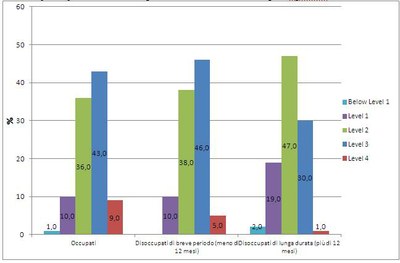Persistent unemployment may cause a decrease in skill levels: long-term (more than 12 months) unemployed individuals attain a substantially lower average score compared to short-term unemployed (respectively 239 and 251 points), with an even sharper gap (15-point difference) between employed and long-term unemployed workers.
The following chart further confirms that the status of recent unemployment allows workers to maintain performance levels acquired or kept during employment status, while long-term unemployment results in a decrease. In this chart PIAAC respondents who reported to work in high-skilled categories[1] are compared to those who have been unemployed for less and more than 12 months and have worked in the same job category.
The percentage of Italian workers presently employed in high knowledge content jobs and ranking at skill level 3 or above is equal to 52%, very close to that of those who have been unemployed for less than 12 months and have carried out high-skilled jobs (51%), far higher percentages compared to those who have been unemployed for more than 12 months and have carried out high-skilled jobs (31%).
Percentage distribution in literacy skill levels of employed workers, workers unemployed for less than 12 months and workers unemployed for more than 12 months who work or have worked in high-skilled categories.

[1] i.e. falling within levels 1, 2 and 3 of the International Standard Classification of Occupations (ISCO-08)
Overview and data processing by Simona Mineo